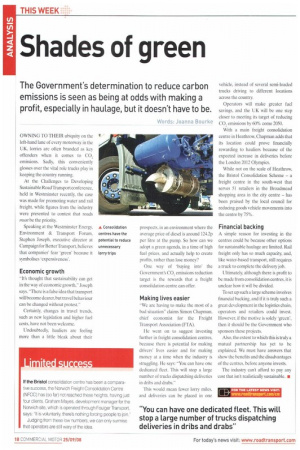Shades of green
Page 18

If you've noticed an error in this article please click here to report it so we can fix it.
The Government's determination to reduce carbon emissions is seen as being at odds with making a profit, especially in haulage, but it doesn't have to be.
Words: Joanna Bourke
OWNING TO THEIR ubiquity on the left-hand lane of every motorway in the lorries are often branded as key offenders when it comes to CO2 emissions. Sadly, this conveniently glosses over the vital role trucks play in keeping the country running.
At the Challenges to Developing Sustainable Road Transport conference, held in Westminster recently, the case was made for promoting water and rail freight, while figures from the industry were presented to contest that roads must be the priority.
Speaking at the Westminster Energy. Environment & Transport Forum. Stephen Joseph, executive director at Campaign for Better Transport, believes that companies' fear 'green' because it symbolises 'expensiveness'.
Economic growth
"It's thought that sustainability can get in the way of economic growth," Joseph says. "There is a false idea that transport will become dearer, but travel behaviour can be changed without protest."
Certainly, changes in travel trends, such as new legislation and higher fuel costs, have not been welcome.
Undoubtedly, hauliers are feeling more than a little bleak about their prospects. in an environment where the average price of diesel is around 1242p per litre at the pump. So how can we adopt a green agenda, in a time of high fuel prices, and actually help to create profits, rather than lose money?
One way of 'buying into' the Government's CO, emissions reduction target is the rewards that a freight consolidation centre can offer.
Making lives easier
"We are having to make the most of a bad situation" claims Simon Chapman, chief economist for the Freight Transport Association (FTA).
He went on to suggest investing further in freight consolidation centres, because there is potential for making drivers lives easier and for making money at a time when the industry is struggling. He says: "You can have one dedicated fleet. This will stop a large number of trucks dispatching deliveries in dribs and drabs."
This would mean fewer lorry miles. and deliveries can he placed in one vehicle, instead of several semi-loaded trucks driving to different locations across the country.
Operators will make greater fuel savings, and the UK will be one step closer to meeting its target of reducing CO, emissions by 60% come 2050.
With a main freight consolidation centre in Heathrow, Chapman adds that its location could prove financially rewarding to hauliers because of the expected increase in deliveries before the London 2012 Olympics.
While not on the scale of Heathrow, the Bristol Consolidation Scheme — a freight centre in the south-west that serves Si retailers in the Broadmead shopping area in the city centre — has been praised by the local council for reducing goods vehicle movements into the centre by 75%.
Financial backing
A simple reason for investing in the centres could be because other options for sustainable haulage are limited. Rail freight only has so much capacity, and, like water-based transport. still requires a truck to complete the delivery job.
Ultimately, although there is profit to be made from consolidation centres, it is unclear how it will be divided.
To set up such a large scheme involves financial backing, and if it is truly such a great development in the logistics chain, operators and retailers could invest. However, if the motive is solely 'green', then it should be the Government who sponsors these projects.
Also, the extent to which this is truly a mutual partnership has yet to be explained. We must have answers that show the benefits and the disadvantages of the centres, before anyone invests.
The industry can't afford to pay any cost that isn't realistically sustainable. • M., FOR THE LATEST NEWS VISIT: www.roadtransport.comicm




































































































































































